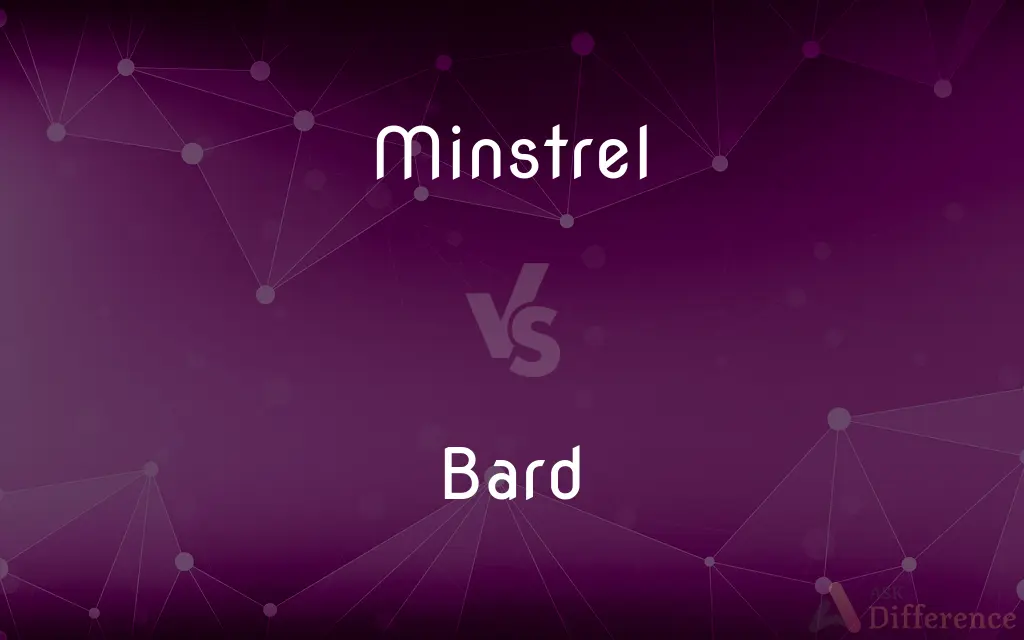Minstrel vs. Bard — What's the Difference?
Edited by Tayyaba Rehman — By Fiza Rafique — Updated on April 1, 2024
Minstrels were medieval entertainers who sang and performed, often of lower social status, while bards were poet-singers specializing in composing and reciting verses about heroes and historical events, typically holding a higher social regard.

Difference Between Minstrel and Bard
Table of Contents
ADVERTISEMENT
Key Differences
Minstrels were versatile entertainers in medieval Europe, known for their ability to sing, play instruments, and sometimes even juggle or perform acrobatics. They traveled from place to place, performing in courts and public spaces, relying on their wide range of skills to entertain diverse audiences. In contrast, bards were revered as storytellers, musicians, and poets, deeply rooted in the ancient traditions of cultures like the Celts, where they played a crucial role in preserving and transmitting the oral history and cultural heritage of their people.
The role of minstrels evolved over time, initially seen as esteemed entertainers, their status gradually diminished, becoming more associated with itinerant performers of lower social standing. Bards, however, maintained their esteemed status within society, often serving as advisors and historians to chieftains and kings, reflecting their integral role in maintaining the cultural identity and lineage of their communities.
Minstrels performed a wide variety of material, from humorous ballads to romantic songs, often adapting their performances to suit the tastes of their current audience. Bards, on the other hand, focused on epic tales and poems that recounted the deeds of historical figures and legendary heroes, imbuing their recitations with a sense of gravitas and cultural significance.
While minstrels were primarily entertainers, seeking to amuse and delight their audience for reward or patronage, bards were considered keepers of knowledge and tradition, with their performances serving to educate and instill moral values. Their work was often characterized by a deeper connection to the spiritual and ancestral roots of their society.
Despite these differences, both minstrels and bards played crucial roles in their societies, providing entertainment, preserving history, and shaping the cultural narrative. Their legacy continues to influence modern storytelling, music, and poetry, highlighting the enduring power of oral traditions and performance art.
ADVERTISEMENT
Comparison Chart
Social Status
Often of lower social standing
Held in high regard, often advisors to leaders
Primary Function
Entertainment through songs and performances
Preservation and recitation of historical and heroic verses
Repertoire
Varied, including humorous and romantic ballads
Epic tales and poems about heroes and history
Audience
Courts, public spaces, wide-ranging
Chiefs, nobility, culturally specific groups
Role in Society
Entertainers, performers
Historians, cultural preservers, educators
Skills
Singing, playing instruments, sometimes acrobatics
Storytelling, poetry, music composition
Historical Context
Medieval Europe
Ancient traditions, particularly Celtic
Legacy
Entertainment and popular music
Cultural preservation, storytelling
Compare with Definitions
Minstrel
An itinerant performer of songs and music.
Traveling from village to village, the minstrel brought news and entertainment.
Bard
A poet-singer skilled in composing and reciting verses about heroes and historical events.
The bard recited an epic poem that extolled the heroic deeds of the clan’s ancestors.
Minstrel
Entertained diverse audiences, adapting performances accordingly.
The minstrel tailored his songs to suit the tastes of the local townsfolk.
Bard
Often revered within their communities, serving as advisors and historians.
The chieftain consulted the bard for wisdom and knowledge of historical precedents.
Minstrel
Often associated with performing a wide variety of works.
The minstrel’s repertoire ranged from comedic tales to romantic serenades.
Bard
Specialized in storytelling that combined music, poetry, and historical narration.
The bard’s storytelling intertwined melodies with tales of valor and tragedy.
Minstrel
A medieval singer or musician who entertained in courts and public spaces.
The minstrel played his lute and sang ballads to the gathered crowd.
Bard
Held an important role in preserving oral history and culture.
Bards were crucial in keeping the ancient legends alive through generations.
Minstrel
Seen as a lower class of entertainer as time progressed.
Once revered, minstrels found themselves performing in streets for spare coins.
Bard
Their performances were imbued with cultural significance and moral lessons.
Through his narratives, the bard imparted lessons on honor, loyalty, and bravery.
Minstrel
A minstrel was a medieval European entertainer. Originally describing any type of entertainer such as a musician, juggler, acrobat, singer or fool, the term later, from the sixteenth century, came to mean a specialist entertainer who sang songs and played musical instruments.
Bard
In Celtic cultures, a bard is a professional story teller, verse-maker, music composer, oral historian and genealogist, employed by a patron (such as a monarch or noble) to commemorate one or more of the patron's ancestors and to praise the patron's own activities. Originally bards were a specific lower class of poet, contrasting with the higher rank known as fili in Ireland and Highland Scotland.
Minstrel
A medieval entertainer who traveled from place to place, especially to sing and recite poetry.
Bard
A poet, traditionally one reciting epics and associated with a particular oral tradition
Our national bard, Robert Burns
Minstrel
A lyric poet.
Bard
A rasher of fat bacon placed on meat or game before roasting.
Minstrel
A musician.
Bard
Cover (meat or game) with rashers of fat bacon
The venison was barded and marinated
Minstrel
A performer in a minstrel show.
Bard
One of an ancient Celtic order of minstrel poets who composed and recited verses celebrating the legendary exploits of chieftains and heroes.
Minstrel
(historical) Originally, an entertainer employed to juggle, play music, sing, tell stories, etc.; a buffoon, a fool, a jester; later, a medieval (especially travelling) entertainer who would recite and sing poetry, often to their own musical accompaniment.
Bard
A poet, especially a lyric poet.
Minstrel
(by extension)
Bard
A piece of armor used to protect or ornament a horse.
Minstrel
Any lyric poet, musician, or singer.
Bard
To equip (a horse) with bards.
Minstrel
One of a troupe of entertainers, often a white person who wore black makeup (blackface), to present a so-called minstrel show, being a variety show of banjo music, dance, and song (now sometimes regarded as racist).
Bard
To cover (meat) in thin pieces of bacon or fat to preserve moisture during cooking.
Minstrel
An amphetamine tablet, typically black, or black and white, in colour.
Bard
A professional poet and singer, like among the ancient Celts, whose occupation was to compose and sing verses in honor of the heroic achievements of princes and brave men.
Minstrel
(transitive) To play (a tune on a musical instrument); to sing (a song).
Bard
(by extension) A poet.
Shakespeare is known as the bard of Avon.
Minstrel
(intransitive) To act as a minstrel; to entertain by playing a musical instrument, singing, etc.
Bard
Defensive armor formerly worn by a man at arms.
Minstrel
In the Middle Ages, one of an order of men who subsisted by the arts of poetry and music, and sang verses to the accompaniment of a harp or other instrument; in modern times, a poet; a bard; a singer and harper; a musician.
Bard
(cooking) A thin slice of fat bacon used to cover any meat or game.
Minstrel
A singer of folk songs
Bard
The exterior covering of the trunk and branches of a tree; the rind.
Minstrel
A performer in a minstrel show
Bard
Specifically, Peruvian bark.
Minstrel
Celebrate by singing, in the style of minstrels
Bard
To cover a horse in defensive armor.
Bard
(cooking) To cover (meat or game) with a thin slice of fat bacon.
Bard
A professional poet and singer, as among the ancient Celts, whose occupation was to compose and sing verses in honor of the heroic achievements of princes and brave men.
Bard
Hence: A poet; as, the bard of Avon.
Bard
Defensive armor formerly worn by a man at arms.
Bard
A thin slice of fat bacon used to cover any meat or game.
Bard
The exterior covering of the trunk and branches of a tree; the rind.
Bard
Specifically, Peruvian bark.
Bard
To cover (meat or game) with a thin slice of fat bacon.
Bard
A lyric poet
Bard
An ornamental caparison for a horse
Bard
Put a caparison on;
Caparison the horses for the festive occasion
Common Curiosities
What distinguishes a minstrel from a bard?
Minstrels were primarily entertainers with varied performances, while bards were revered for their storytelling and cultural preservation roles.
Were bards considered more important than minstrels in history?
Yes, bards were often held in higher esteem, serving as advisors and historians, unlike minstrels, who were seen more as itinerant entertainers.
Can the terms minstrel and bard be used interchangeably?
Not accurately, due to their different roles, social status, and types of performances.
What skills were common to both minstrels and bards?
Both were skilled in music and storytelling, though their focuses and social roles differed.
How did audiences differ for minstrels and bards?
Minstrels entertained a broad audience, including the general public, while bards’ audiences were more culturally specific and often of higher social standing.
Why were bards important in ancient cultures?
They preserved oral history and cultural traditions, educating and instilling moral values through their performances.
Did minstrels travel more than bards?
Typically, yes, minstrels were more likely to be itinerant, traveling widely to perform, while bards often served specific communities or leaders.
Did minstrels and bards perform the same types of songs?
No, minstrels performed a wide range of material, including humorous and romantic songs, while bards focused on epic tales and historical poems.
What legacy have minstrels and bards left in modern culture?
Their influence is seen in modern storytelling, music, and the preservation of cultural traditions and histories.
How did the role of minstrels change over time?
Initially esteemed, minstrels’ social standing declined over time, associating them more with street performers.
Share Your Discovery

Previous Comparison
Impaired vs. Disturbed
Next Comparison
Bad vs. FoulAuthor Spotlight
Written by
Fiza RafiqueFiza Rafique is a skilled content writer at AskDifference.com, where she meticulously refines and enhances written pieces. Drawing from her vast editorial expertise, Fiza ensures clarity, accuracy, and precision in every article. Passionate about language, she continually seeks to elevate the quality of content for readers worldwide.
Edited by
Tayyaba RehmanTayyaba Rehman is a distinguished writer, currently serving as a primary contributor to askdifference.com. As a researcher in semantics and etymology, Tayyaba's passion for the complexity of languages and their distinctions has found a perfect home on the platform. Tayyaba delves into the intricacies of language, distinguishing between commonly confused words and phrases, thereby providing clarity for readers worldwide.














































